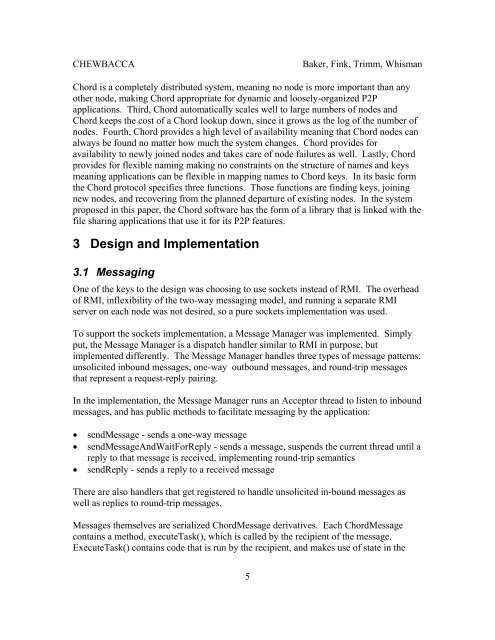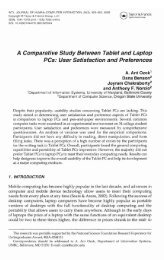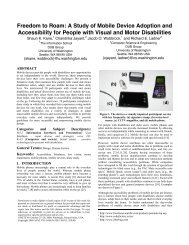Implementing a Distributed Peer to Peer File Sharing System ... - Umbc
Implementing a Distributed Peer to Peer File Sharing System ... - Umbc
Implementing a Distributed Peer to Peer File Sharing System ... - Umbc
Create successful ePaper yourself
Turn your PDF publications into a flip-book with our unique Google optimized e-Paper software.
CHEWBACCA Baker, Fink, Trimm, Whisman<br />
Chord is a completely distributed system, meaning no node is more important than any<br />
other node, making Chord appropriate for dynamic and loosely-organized P2P<br />
applications. Third, Chord au<strong>to</strong>matically scales well <strong>to</strong> large numbers of nodes and<br />
Chord keeps the cost of a Chord lookup down, since it grows as the log of the number of<br />
nodes. Fourth, Chord provides a high level of availability meaning that Chord nodes can<br />
always be found no matter how much the system changes. Chord provides for<br />
availability <strong>to</strong> newly joined nodes and takes care of node failures as well. Lastly, Chord<br />
provides for flexible naming making no constraints on the structure of names and keys<br />
meaning applications can be flexible in mapping names <strong>to</strong> Chord keys. In its basic form<br />
the Chord pro<strong>to</strong>col specifies three functions. Those functions are finding keys, joining<br />
new nodes, and recovering from the planned departure of existing nodes. In the system<br />
proposed in this paper, the Chord software has the form of a library that is linked with the<br />
file sharing applications that use it for its P2P features.<br />
3 Design and Implementation<br />
3.1 Messaging<br />
One of the keys <strong>to</strong> the design was choosing <strong>to</strong> use sockets instead of RMI. The overhead<br />
of RMI, inflexibility of the two-way messaging model, and running a separate RMI<br />
server on each node was not desired, so a pure sockets implementation was used.<br />
To support the sockets implementation, a Message Manager was implemented. Simply<br />
put, the Message Manager is a dispatch handler similar <strong>to</strong> RMI in purpose, but<br />
implemented differently. The Message Manager handles three types of message patterns:<br />
unsolicited inbound messages, one-way outbound messages, and round-trip messages<br />
that represent a request-reply pairing.<br />
In the implementation, the Message Manager runs an Accep<strong>to</strong>r thread <strong>to</strong> listen <strong>to</strong> inbound<br />
messages, and has public methods <strong>to</strong> facilitate messaging by the application:<br />
• sendMessage - sends a one-way message<br />
• sendMessageAndWaitForReply - sends a message, suspends the current thread until a<br />
reply <strong>to</strong> that message is received, implementing round-trip semantics<br />
• sendReply - sends a reply <strong>to</strong> a received message<br />
There are also handlers that get registered <strong>to</strong> handle unsolicited in-bound messages as<br />
well as replies <strong>to</strong> round-trip messages.<br />
Messages themselves are serialized ChordMessage derivatives. Each ChordMessage<br />
contains a method, executeTask(), which is called by the recipient of the message.<br />
ExecuteTask() contains code that is run by the recipient, and makes use of state in the<br />
5











